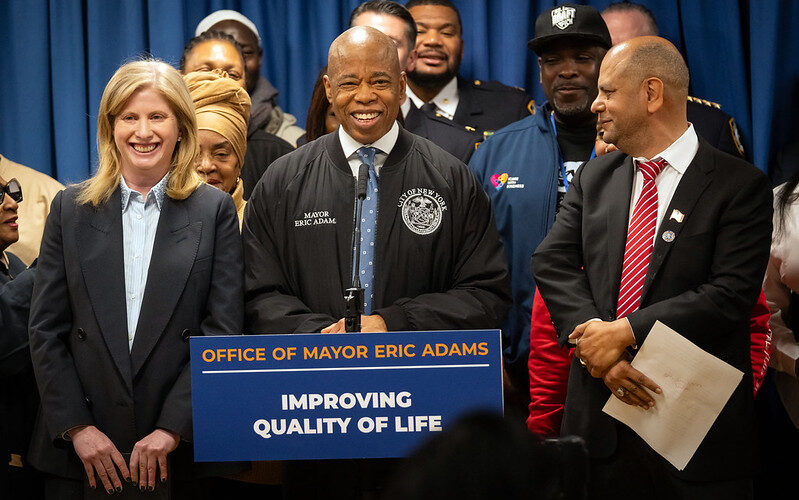We welcome the NYPD’s new Quality of Life Division, a pilot program of Mayor Adams and Commissioner Jessie Tisch that began this week, and so should every New Yorker who is fed up with the very familiar bothers that we all have to suffer with.
From ear-shattering dirt bikes and other illegal two-wheelers like mopeds disturbing the peace to noisy nightclubs and illegal parking and illegal dumping and illegal homeless encampments, none of these situations are emergencies and none involve violence. These are not 911 calls, but 311 calls.
And don’t forget about public urination and defecation (see our editorial from last week about the need for many more public toilets).
While major felony crime fell sharply in the first quarter of this year, 311 calls keep going up, so it makes perfect sense for cops to address these minor infractions which are major annoyances.
Tisch said that she is not looking to use ticketing for public drinking or drug use as a way to find offenders wanted for more serious crimes or prevent greater lawlessness, (the broken windows theory), but just to reduce the causes of the complaints.
There are now new dedicated quality of life teams in a few NYPD precincts — one each in Manhattan, Bronx and Queens and two in Brooklyn, as well as a swath of NYCHA developments in Brooklyn (Staten Island, you’ll have to wait for now). In charge is a Quality of Life Division sergeant. The sergeant reports to the special operations lieutenant, all overseen by the precinct’s commanding officer.
In the announcement it said “officers will also receive training on specific topics, such as encampments, derelict vehicles, traffic conditions, enforcement of alternative vehicles, reckless driving, and the use of sound metering devices regarding noise complaints.” Good and better.
Of course, many 311 complaints aren’t for the NYPD, like rat sightings and busted sidewalks and leaky fire hydrants, but where the cause is a person doing wrong, the NYPD is the city’s enforcement arm.
An abandoned car on a street or in a park didn’t get there by itself. The packs of dirt bikes roaring by on what was a quiet street aren’t on autopilot. Homeless encampments don’t fall from the sky. Human bodily waste on the sidewalk doesn’t just appear. In each case, there is someone who is not following the accepted rules that we all need to obey to keep life civilized with more than 8 million close neighbors.
We hear the critics that this is all meant to criminalize the poor. No, no one wants to hassle poor folks and in fact, poor folks are much more likely to be the ones suffering from the anti-social behavior that is pouring in as 311 complaints.
Everyone deserves quiet and clean streets without having other New Yorkers engaging in public activities that should be done in private.
We have confidence that the pilot will prove successful and Tisch promises to keep close measurements on the progress. If it works, then expand it citywide. If it’s a dud, then pull the plug, but it’s worth the experiment to make a great city even better.








